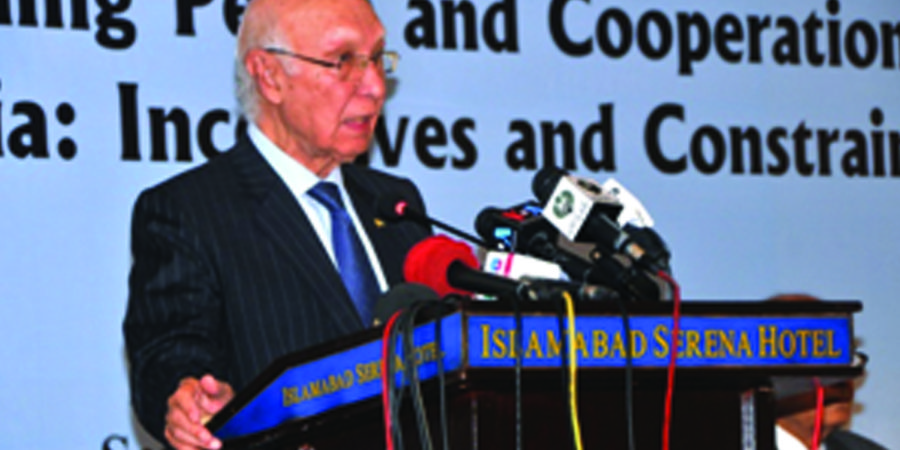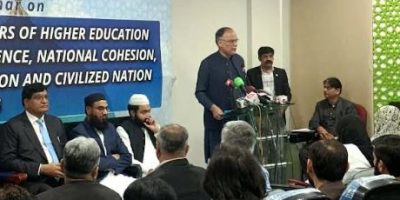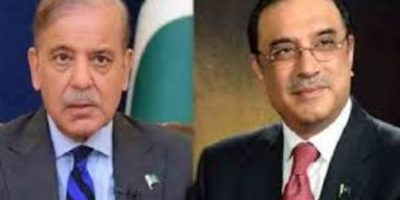India cannot isolate Pakistan in the region: Sartaj

The Indian design to try to isolate Pakistan in the region and the world is only myopic thinking and a futile attempt to assuage the local populace. Pakistan cannot remain aloof to the imbalance of strategic stability created in the region due to the lopsided western policies. We have always supported efforts to maintain strategic balance in the region and has exercised strategic restraint. Pakistan will continue to ensure that this strategic balance is maintained.’ This was shared by Mr. Sartaj Aziz, Adviser to the Prime Minister on Foreign Affairs, Ministry of Foreign Affairs,while delivering his inaugural address at the international conference on ‘Strengthening Peace and Cooperation in South Asia- Incentives and Constraints’ organized by the Islamabad Policy Research Institute and Hanns Seidel Foundation. Reflecting on ways and means to establish peace and cooperation in South Asia, the Advisor shared that the region is faced with multi-dimensional threats warranting multi-pronged strategies. With all the ingredients for sustained conflict already in place, South Asia becomes an exceptional case where internal conflict and violence among States over resources can easily spill over, threatening regional peace and stability. Equally important are the political conflicts in South Asia that emanate from longstanding, unresolved disputes. It is a well-known fact that peace has remained elusive and alien to this region as a result of these conflicts, he remarked. ‘The only regional organization i.e. SAARC has fallen prey to the hegemonic designs of one of the countries in our region, ignoring the important lesson of history that in all successful experiments of regional cooperation like the EU and ASEAN, the bigger countries avoided hegemonic temptations. ‘Pakistan believes that SAARC has the potential to promote peace, development and stability in South Asia. This requires positive engagement from all the Member Countries. In scuttling the SAARC Summit, India has damaged SAARC not Pakistan.’ He expressed apprehension thatIndia continues to pressure Pakistan, by sponsoring terrorism inside the country to foment separatism. India has increased ceasefire violations on the LoC in Jammu and Kashmir to constrain Pakistan Army’s ability to deploy more resources on the western borders with Afghanistan, he highlighted.
Regrettably, India is also openly opposing China Pakistan Economic Corridor (CPEC) for no apparent reason than to obstruct the economic development of Pakistan.He emphasised that Pakistan was exercising maximum restraint in the face of the region’s growing geostrategic imbalance. The international community should pay attention and adopt a balanced approach rather than taking sides. Pakistan cannot remain aloof to the lopsided policies of the West, he said. Mr Aziz stressed the need for NSG to adopt a non-discriminatory criteria-based approach for NSG membership of countries which have never been party to the nuclear Non-Proliferation Treaty (NPT), and highlighted the brutalities in Indian Occupied Jammu and Kashmir (IOK) against innocent and defenceless civilians, who were peacefully protesting and struggling for the realization of their right to self-determination.He said that India is under the delusion that Kashmiri uprising is terrorism. Riding on this denial and delusions, it holds Pakistan responsible for the crisis in Indian-Occupied Kashmir and continues to perpetrate grave human rights violations. ‘For peace in Kashmir, India must face the ground realities and recognize indigenous nature of the Kashmiri movement for the right to self determination. ‘Pakistan will continue to seek normalisation of relations with India because as a responsible state, we realize the imperative of strategic stability and need for credible minimum deterrence,’ he emphasised.
In his address, Ambassador (Retd.)Sohail Amin welcomed the delegates from Nepal, China, Afghanistan, France and Sri Lanka. He said ‘it is not military muscle which is a symbol of state status, rather it is their contribution towards meeting the common challenges of peace and prosperity, which is a real emblem of status.’ According to Ambassador Amin, the traditional trend of projection of power is no more relevant in today’s globalized world. There is now a clear distinction between states – which are enhancing their power for dominance and others which are making their contributions to meet the challenges of peace, prosperity, and environmental protection. India must realize this in the present day world, he stressed. Pakistan-India conflicting relationship due to their longstanding bilateral disputes, especially Kashmir, India’s on-going military modernisation in nuclear and conventional arms, structural limitations of SAARC, lack of infrastructure and uncooperative policy approaches of some countries are causing divisions in South Asia, he shared. ‘The postponement of the SAARC summit due to Indian attitude will have a direct bearing on peace and prosperity in South Asia. With this kind of attitude, consolidation of cooperation in the region would remain an elusive idea’, he remarked.
In the session on ‘Strengthening Peace and Cooperation in South Asia: Regional Perspectives’ chaired by Ambassador InamulHaque, Former Foreign Minister, Ms. DayaniPanagoda, Policy Specialist at German Development Cooperation (GIZ), Colombo, gave the Sri Lankan perspective on the main theme. She said that with China emerging as a trading giant and the economic rise of India, North Korea and Japan, the global economy is shifting its center of gravity from the West to Asia. ‘Politically, the unipolar world is in wane and multipolar world is in the making,’ she highlighted. According to her, while the world is yet to experience the ideological shifts of global power blocks after the new president enters the White House and the Russian alignment with them, the strategic importance of South Asia has become more relevant, especially with the development of new infrastructure facilities in sea routes and the silk route project in the Indian Ocean. She stressed that South Asia should be poised to reap the harvest of these global shifts in a positive tone.
With increase of trading in the Indian Ocean, there will be opportunities in new economic activities such as shipping, financing, banking, insurance and information technology. But while there are incentives, there are also challenges especially those of terrorism, spread of conventional and non-conventional arms, human trafficking and narcotics smuggling. ‘Unequal economic development and rising living standards lead to conflict and violence rather than peace and stability, hence, a regional approach and a joint master plan is required to address these challenges and move on a stable and competitive economic growth’, she recommended. Sri Lanka believes that peace in the country is closely linked with peace in the region and in the world. ‘Regionally, it is the conflict between India and Pakistan that takes the centre stage of South Asian regional politics and peace. Sri Lanka with its belief in Asia-centric middle-path foreign policy could provide the leadership for a committee represented by all the countries in the region. ‘Sri Lanka’s current experience in peace-building could be a valuable asset in creating a peaceful South Asian region’, she proposed.
Dr. MoonisAhmar, Dean Faculty of Social Sciences and Meritorious Professor at the University of Karachi, outlined four major changes which will shape things in South Asia once the process of peace and cooperation is unleashed. First, economic dividends of peace will substantially improve the quality of life of more than one billion people in terms of better education, health, housing and transport facilities. Second, when the quality of life of people will improve the menace of intolerance, extremism, radicalization, militancy, violence and terrorism will also be controlled. ‘When poverty, economic and social backwardness is deep rooted in a society, extremist and violent forces take advantage of the situation’, he stressed. Third, the shift from conflict to cooperation in South Asia can only take place when youth are provided a better sense of direction about their future. Fourth, South Asia will gain prestige in the world only if it transforms from conflict and crisis ridden underdevelopment to peaceful, stable development. ‘There is no point in reinventing the wheel, but with an innovative approach based on respect of sovereignty, territorial integrity, focus on human and social development can go a long way in guaranteeing regional peace and augment the process of meaningful regional cooperation,’ he recommended.
Discussing the ‘Dividends of Energy Cooperation in South Asia’, Brigadier General (Retd) Dharma BahadurBaniya from Nepal said that South Asia is going through a phase of economic transformation from low to high growth, but persistent shortage of energy has been a major factor in restricting the region’s rapid upward trajectory. In his presentation, he highlighted how existing energy shortages and growing import of fossil fuels impose a heavy cost in terms of energy insecurity. He shared various initiatives for regional energy sector integration by South Asian national governments, multilateral and bilateral agencies. He provided details of key drivers of regional energy cooperation such as the demand-supply gap; need for sustainable energy development; improved reliability of interconnected energy systems; and exploiting opportunities for electricity trade due to energy shortages and limited reserves in the national energy systems. ‘Inter-connected power systems can reduce the costs of maintaining reserves across the region,’ he pointed out. Regional energy cooperation provides an ideal platform to enable sustainable growth by synergizing the development of resources. Such cooperation in the energy sector will certainly help South Asian nations strengthen national energy security, reduce the costs, adopt clean energy sources and meet the energy requirement for peace, development and cooperation. In his perspective, energy diplomacy can lead to resolution of conflicts between countries. ‘India and Pakistan have huge untapped reserves of energy. Collaboration can lend impetus to accelerated growth and development in both countries, which have a huge appetite for energy,’ he said.
Summing up the session, Ambassador Inam shared that while there are numerous constraints, incentives for peace should be the region’s main drivers towards sustainable development since issues like climate change, poverty, water stress and population explosion are foreboding transnational concerns which will overtake security concerns if they are not resolved, collectively.
‘Political, economic and technological factors are exacerbating the challenges to strategic stability in South Asia,’ said Syed Muhammad Ali from the Centre for International Strategic Studies. He was speaking on strategic stability and arms control in SA.‘The growing disparity in the land, air, sea, space, strategic and non-kinetic domains between India and Pakistan is a consequence of these geopolitical, geo-economic and technological factors,’ he said. Dr Huang Ying, Associate Researcher from the Institute of World Economic Relations, China Institutes of Contemporary International Relations (CICIR), Beijing, China discussed ‘Opportunities forEnhancing FDI in South Asia through OBOR and AIIB projects.’The OBOR initiative is China’s response to the 2008 international crisis, to reduce its over-reliance on developed markets and to reduce the income gap between its coastal areas and inner provinces by redefining the importance of its neighboring countries to its economic development, she proclaimed. The OBOR initiative and AIIB have the potential to help South Asia, a region considered the least connected in terms of infrastructure, trade and investments, to prosper economically, she stressed. ProfessorKhalidaGhaus, Managing Director, Social Policy and Development Centre, Karachi, emphasized the importance of human security and socioeconomic development. Social sector is the most neglected sector in the whole region, which further adds to the challenges of poverty, malnourishment, unemployment, economic interdependence, regional connectivity, she held
Related News

Lahore seminar links Prophet’s “P.B.U.H” life with national cohesion goals
ISLAMABAD/LAHORE, FEB 21 /DNA/ – The Higher Education Commission (HEC), in collaboration with the MinistryRead More

President, PM strongly condemn terrorist attack on security forces in Bannu
ISLAMABAD, Feb 21 (DNA): President Asif Ali Zardari and Prime Minister Muhammad Shehbaz Sharif, Saturday,Read More


Comments are Closed